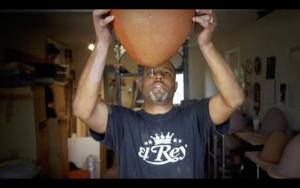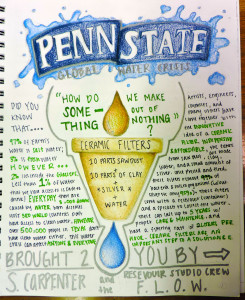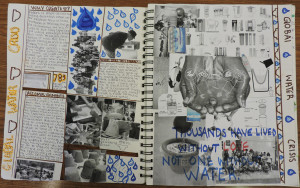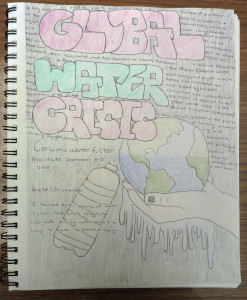Shelby Kaplan | For the Collegian | Posted 21 hours ago
Over half a million people in Texas do not have access to paved roads, electricity or clean water — and Visual Arts professor B. Stephen Carpenter II is trying to do something about that.
Carpenter is taking action and doing his part to not only help those in Texas — but those in the African Diaspora as well.
With support and funding from the Africana Research Center , Carpenter was able to start his work and research to begin educating kids in grades K-12 about the Diaspora water crisis.
Carpenter uses his visual arts curriculum to get Penn State students involved as well.
“We didn’t invent the water filters,” Carpenter said. “But I was enamored with what they do — they are simple, and powerful. They take contaminated water and make it potable, while only being made of basically clay and sawdust.”
Carpenter said he set four main goals for this project.
“I want a new understanding to emerge as we go, and for people to realize water is a basic human right,” Carpenter said. “As we work more through collaboration, hopefully the kids will gain an understanding for the water crisis as whole.”
Carpenter is also working with schools that take part in the International Baccalaureate Program.
“These students are gaining credit and discipline, but are also keeping a portfolio and learning to do research, a huge aspect of the project,” Carpenter said.
The fourth goal Carpenter has set he said he feels should be stressed the most is “it is a way to explore the IB structure with socially engaged art practice and education.”
Although he has not traveled to the African Diaspora, Carpenter has been to Laredo, Texas — a community which is suffering its own water crisis.
“The point of the project is affordability, instead of sending water filters all over the world, we are trying to set up centers in the areas of need,” Carpenter said.
Helping with the project locally is graduate student Felix Rodriguez.
“I have been in charge of building, designing and maintaining the website for the project,” Rodriguez said. “Part of my duty includes contacting partners, crafting and editing content on the website and help in identifying potential resources.”
Another person Carpenter has worked with is Erika Hitchcock , an IB Visual Arts Teacher at Green Run Collegiate Charter School in Virginia , whose students visited Penn State and worked with Carpenter for a week this past September.
“Students are motivated to turn ideas into action and many have shown interest in furthering their knowledge about water in other disciplines such as marine biology and chemistry.” Hitchcock said. “Having this first-hand experience has resulted in greater enthusiasm for learning and more ownership and interest to global issues.”
 The presentation took place in the auditorium supported by slides and a display which included a water filter, ceramic receptacle, books, and a portable water filter press. The water filter production demonstration took place in the art room after the presentation. The art room was filled to capacity. We produced a water filter from scratch with cooperation from students.
The presentation took place in the auditorium supported by slides and a display which included a water filter, ceramic receptacle, books, and a portable water filter press. The water filter production demonstration took place in the art room after the presentation. The art room was filled to capacity. We produced a water filter from scratch with cooperation from students.




 “In our discussions, the students asked pointed, researched questions about the global water crisis, affordable access to water and appropriate technology responses,” said Carpenter. “Their interest is genuine and extends beyond merely responding to a class assignment. They seem committed to contributing positively and productively to the work.”
“In our discussions, the students asked pointed, researched questions about the global water crisis, affordable access to water and appropriate technology responses,” said Carpenter. “Their interest is genuine and extends beyond merely responding to a class assignment. They seem committed to contributing positively and productively to the work.”












